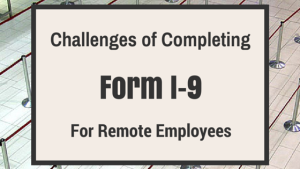Challenges of Completing the Form I-9 for Remote Employees

In today’s globalized economy, more and more industries rely on telecommuters and remote employees to fill in positions, whether part-time or full-time. One of the challenges that our corporate clients are faced with in such a global market is the difficulty of getting remote employees to appear in person at the employer’s location and complete and sign Form I-9 at the beginning of employment.
The standard Form I-9 compliance regulations require that the employee completes and signs Section 1 of Form I-9 at the first date of employment (“date of hire”). The employee must submit the employment verification documents within three (3) days from the date of hire. The employer is required to complete and sign Section 2 of Form I-9 within three (3) days from the employee’s date of hire. Before signing Section 2, the employer must personally inspect the employment verification documents to confirm that the items appear genuine. Any employment verification of the documents that is not face-to-face (such as videoconferencing, Skype, fax, phone) between the employee and the employer is not permissible and leaves any employer at risk. So how can an employer verify an employee’s documents if the employee resides miles away from the company’s facility?
To remedy this problem facing the fast-growing mobile workforce, one step that the Department of Homeland Security undertook is to allow employers to “designate an authorized representative to fill out Forms I-9 on their behalf, including personnel officers, foremen, agents or notary public” (USCIS Handbook for Employers, April 2013 edition).
The use of notaries for completing Form I-9 is commonly used by the remote workforce. The remote employee can simply meet locally in person with a notary public in his or her area. The notary verifies and identifies the original documents and then completes and signs Section 2 of Form I-9. Form I-9 does not need to be notarized. Many employers have a designated group of notaries in various locations that they use for the completion of Forms I-9 for remote employees.
Larger employers with a more significant number of remote employees may additionally utilize electronic I-9 system software. The use of I-9 management services for workforce solutions is growing. These types of software allow the employee to input data from Section 1 of Form I-9 into a system and the data is then stored and validated electronically. This enables the data to be searchable electronically and eases the time-consuming task for employers of recording information from a paper Form I-9 to their company’s system. Some I-9 software still require the employee to visit a local designated branch where they can have Section 2 completed in person by a representative serving as the employer’s agent. Other types of software allow the employee to enter all of the required data electronically and then submit an electronic signature without ever having to appear in person at any location for document verification.
If your organization decides to take the plunge and move to electronic I-9 storage system, please keep in mind that any software must be used with continual compliance in mind. Particularly in view of United States Immigration and Customs Enforcement (ICE) auditors who are becoming well-versed in pointing out potentially non-compliant software features, HR executives should scrutinize their software options carefully. They can vet and demand more adaptations to meet the continuing changes in the industry that some vendors simply do not have the vested interest, time, or knowledge to meet. As the market for electronic Form I-9 software has matured, the shift to specialized software will be easier to implement. No matter which system you pick, the most important advice for switching to electronic I-9s is that the burden is on the employer to properly vet their software. Any deficiencies found in an organization’s software will be directly attributed to the organization and not to the vendor.
How Can We Help
The Capitol Immigration Law Group can provide various levels of internal I-9 compliance audits and on-site employee training as well as training materials and guidance for performing regular audits and training. We can provide immigration compliance training and auditing to meet an employer’s specific needs. We encourage all employers to be mindful of their compliance requirements and to proactively and regularly audit their compliance before a government agency does. We also invite you to subscribe to our free weekly immigration newsletter to receive timely updates on this and related topics. We also invite you to contact us if our office can be of any assistance or you have any questions or comments.
Related News and Articles
The Capitol Immigration Law Group has been serving the business community for over 15 years and is one of the most widely respected immigration law firms focused solely on U.S. employment-based immigration. Disclaimer: we make all efforts to provide timely and accurate information; however, the information in this article may become outdated or may not be applicable to a specific set of facts. It is not to be construed as legal advice.
